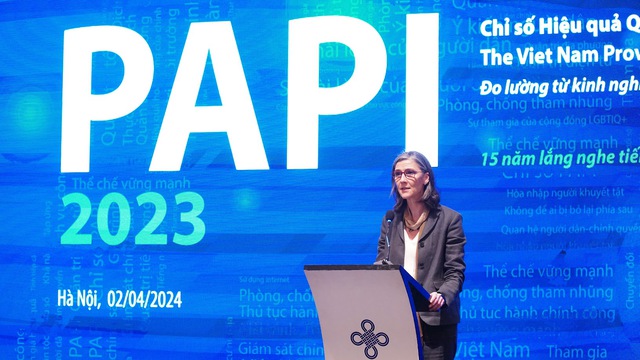PAPI 2023 report shows progress in corruption fight, e-governance
VGP - The 15th edition of the Provincial Governance and Public Administration Performance Index (PAPI) report capturing citizen perceptions of local governance in 2023 shows progress in anti-corruption and e-governance.

UNDP Resident Representative Ramla Khalidi at the ceremony
The 2023 PAPI report was launched at an event in Ha Noi on April 2.
The central province of Thua Thien-Hue took the lead among 63 localities in the PAPI 2023 Rankings with 46.04 points.
The northern provinces of Thai Nguyen and Bac Ninh came second and third with 45.78 points and 45.7 points, respectively.
The capital city of Ha Noi gained the highest score among five centrally-run cities with 43.9 points, followed by Da Nang 42.6, Hai Phong 42.1, Ho Chi Minh City 41.7 and Can Tho 40.1.
The improvement in citizen perceptions on control of corruption at the local level rose from 6.71 points in 2022 to 6.77 in 2023. Citizens reported a perceived decline in five out of the eight types of corruption measured by PAPI.
Another key PAPI focus in 2023 was e-governance, following the Government's push to expand digital citizenship. E-governance is a force multiplier for better governance. It can help provinces streamline administrative procedures while helping citizens interact with the government in a more transparent manner.
It is thus positive to note that, in 2023, access to the internet and access to provincial e-governance portals both rose relative to 2020. At the same time, while nearly 80 percent of PAPI survey respondents in 2023 had internet access at home, the results also highlighted digital divides.
"With PAPI's wealth of data providing evidence for policymaking, we encourage all provinces to engage stakeholders and take action to increase citizen satisfaction with their performance in 2024 and beyond. Bright spots were evident in 2023, especially in combatting corruption and unlocking the potential of e-governance," said UNDP Resident Representative Ramla Khalidi.
The PAPI is a policy monitoring tool that assesses citizen experiences and satisfaction with government performance at the national and sub-national levels in governance, public administration and public service delivery.
Following the initial pilot in 2009 and a larger survey in 2010, the PAPI survey has been implemented nationwide each year since 2011. In total, 197,779 Vietnamese citizens nationwide have been directly interviewed for PAPI since 2009.
PAPI measures eight dimensions: participation at local levels, transparency, vertical accountability, control of corruption, public administrative procedures, public service delivery, environmental governance and e-government.
PAPI is a joint collaboration between the Centre for Community Support Development Studies (CECODES) under the Viet Nam Union of Science and Technology Associations (VUSTA), and the United Nations Development Program (UNDP) in Viet Nam./.
